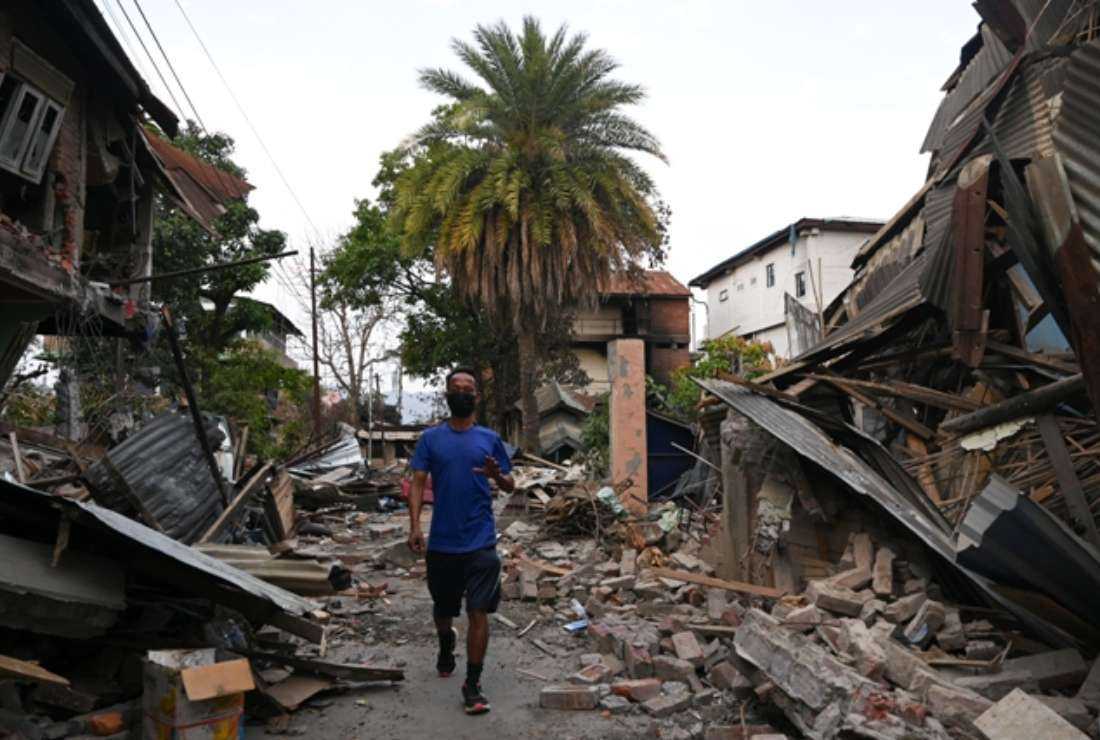Bishops’ body in Kerala says the ‘well-orchestrated’ violence in the northeastern state exposes BJP’s ‘double standards’

A man walks past a house that was set on fire and vandalized by mobs in Khumujamba village on the outskirts of Churachandpur on May 9 in a violence-hit area of the north-eastern Indian state of Manipur. (Photo: AFP)
The sectarian violence in Manipur state in north-eastern India was “well-orchestrated” and “targeted the Kuki tribe,” 90 percent of whom are Christians belonging to different denominations, alleged a Catholic bishops’ body from southern Kerala state.
“It is true that the normal conflict between the majority local Hindu community representing Meiteis and indigenous people, mostly Christians, was communalized and used to destroy tribal Christians,” said Father Michael Pulickal, secretary of the Kerala Catholic Bishops’ Commission for Social Harmony and Vigilance, which carried out an inquiry into the Manipur riots.
Father Pulickal told UCA News on May 29, three days after releasing a report of the commission, that “the pro-Hindu Bharatiya Janata Party (BJP) changes its colors for power” and the violence “has exposed the double standards” of the party. The BJP rules India and Manipur state.
The priest, a member of Carmelite of Mary Immaculate, said the commission had gathered inputs from reliable sources as it was difficult to visit the state at the moment due to the ongoing violence that reportedly claimed the lives of over 70 people.
“The riots,” he continued, “had displaced more than 45,000 Kukis and destroyed more than 1,700 houses, Churches and other Christian institutions.”
The commission, explaining its findings, said that “the change in the policies and programs of BJP Chief Minister N. Biren Singh in the state has divided the people into communal lines.”
Singh himself belongs to the Meitei community and is a former journalist.
The hilly state bordering Myanmar witnessed unprecedented violence since May 3 when ethnic tribal groups, primarily Christian, protested against a court decision granting Scheduled Tribe (ST) status to the Meiteis.
Meitei people, who make up 53 percent of Manipur’s 3.2 million people, control political power (they form 40 of 60 lawmakers in the state assembly) and dominate in socio-economic dealings.
Kuki and other tribal groups protest granting ST status to Meitei people as it guarantees reservations under India’s constitution, traditionally granted to disadvantaged tribal communities to ensure political representation and benefits in education and employment.
“So many people lost their lives, livelihoods and homes, but still we do not find any senior national leader of the BJP that is ruling the county and the state condemning it or showing any regret for the violence,” Father Pulickal said.
The priest further pointed to how the BJP in southern Kerala state, where Christians make up 18 percent of the 33 million people, was “trying to woo Christians” while in Manipur “its government was targeting Christians.”
He cautioned the people against the “double standards of the party.”
Referring to recent comments by bishops in Kerala that seemed to favor the BJP, Father Pulickal said: “It is true people misconstrued us as getting close to the BJP. Our bishops were talking to the party in power for addressing various issues plaguing the community members and others in the state. But such efforts could not be a yardstick to conclude that the Christian community is supporting BJP.”
The bishops and other Church leaders in Kerala were well aware that many BJP-ruled states had enacted stringent anti-conversion laws and were targeting Christians and their institutions, the priest added.

